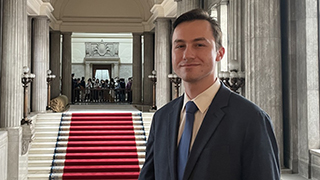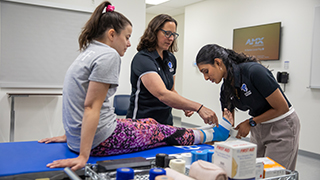Nadia Murad Returns to Seton Hall for World Leaders Forum
Wednesday, December 4, 2024
This article is shared courtesy of the Diplomatic Envoy, the student newspaper of the School of Diplomacy and International Relations.
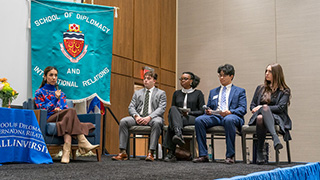
On November 20, 2024, the School of Diplomacy and International Relations hosted its World Leaders Forum, a series that brings together students, faculty and international advocates for powerful discussions on global human rights issues. This forum featured Nobel Peace Prize laureate Nadia Murad, who was awarded an honorary doctorate in 2019 for her tireless work in the fight against human trafficking and sexual violence. Since then, Murad has traveled to conflict zones, advocated at global forums and raised awareness for survivors of sexual violence through Nadia’s Initiative, the nonprofit she founded which aims to rebuild communities plagued by crisis.
Prior to the public forum, students had the opportunity to meet with Murad in a small group setting to discuss her story of captivity and sexual abuse at the hands of the self-proclaimed Islamic State after her hometown of Kocho, Iraq was besieged by the terror group. The discussion was moderated by Professor Ann Marie Murphy and Professor Britta Redwood and included students from the School of Diplomacy’s undergraduate and graduate Gender, Race, and Culture in International Relations courses. The founders of the Zero Chains Initiative at Seton Hall, headed by students Jimmy Murray and Maximillian Otto, also took part in the discussion. This student-led organization aims to advocate for victims of sexual exploitation and human trafficking while raising awareness among students on campus.
Murad began the discussion by describing her upbringing in the farming village of Kocho in the Sinjar district of Iraq. She is the youngest of 11 children and grew up among the Yazidi community, an ethnic and religious minority in the Middle East. Murad was the first in her family to go to high school and dreamed of one day owning a hair salon. She paid a touching tribute to her mother, who was killed in the August 2014 attack along with six of Nadia’s brothers. Murad attributes the death of her mother and many other elder Yazidi women to the Islamic State’s efforts to exterminate the oral traditions and culture of the Yazidi community, which is passed down through generations’ series of stories and unique beliefs. Murad and 6,000 other women and children were taken captive by ISIS and held in sexual slavery. Murad managed to escape and find refuge in Germany.
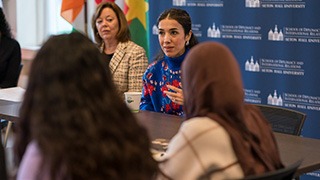 Murad shared the path to sanctuary and fight for justice endured by herself and other
survivors of sexual violence committed by ISIS. She told students about the backlash
she faced from some German nationals amidst the growing refugee population in Germany
and around Europe, but also provided insight into the prosecution of some ISIS members
that were captured and tried in Germany. When asked by Diplomacy students what more
can be done to promote positive change, Murad emphasized the importance of education
and added that one cannot be a part of change if they do not grasp and empathize with
the lived experiences of others.
Murad shared the path to sanctuary and fight for justice endured by herself and other
survivors of sexual violence committed by ISIS. She told students about the backlash
she faced from some German nationals amidst the growing refugee population in Germany
and around Europe, but also provided insight into the prosecution of some ISIS members
that were captured and tried in Germany. When asked by Diplomacy students what more
can be done to promote positive change, Murad emphasized the importance of education
and added that one cannot be a part of change if they do not grasp and empathize with
the lived experiences of others.
Students also had the opportunity to partake in an off-the-record conversation with Murad about her book, The Last Girl: My Story of Captivity, and My Fight Against the Islamic State. Later, Murad participated in a book signing and had one-on-one conversations with students about the impact of her work and their future aspirations in the international arena.
Murad’s keynote address focused on the genocide of the Yazidi people and the horrific use of sexual violence as a weapon in conflict. Murad shared her personal experiences, emphasizing the ongoing struggle for justice for Yazidi survivors. She spoke of her journey as a survivor of ISIS captivity, and her path to becoming a global symbol of hope and resilience for other victims of conflict-related sexual violence.
During the event, students from both undergraduate and graduate programs engaged with Murad by asking thoughtful and challenging questions. Topics ranged from the role of the international community in supporting survivors of violence, to the complexities of refugee resettlement and how young people can advocate for human rights on a global scale.
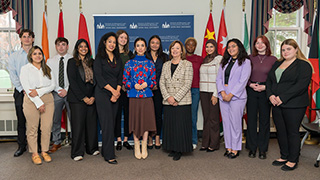 Murad addressed the audience with a call for accountability, highlighting the importance
of justice for survivors. She expressed the shared desire of survivors from across
the world, whether from Sudan, Ukraine, Kosovo or the Congo, to have their day in
court. Murad explained through her work, she hopes to ensure that all victims of sexual
violence in conflict are recognized, their perpetrators held accountable and for the
global community to understand the ongoing need for justice. This shared experience,
despite differences in geographical and cultural contexts, underscores the universal
need for justice. Murad emphasized the importance of political will in pursuing justice,
urging the global community to do more to support survivors and hold perpetrators
accountable.
Murad addressed the audience with a call for accountability, highlighting the importance
of justice for survivors. She expressed the shared desire of survivors from across
the world, whether from Sudan, Ukraine, Kosovo or the Congo, to have their day in
court. Murad explained through her work, she hopes to ensure that all victims of sexual
violence in conflict are recognized, their perpetrators held accountable and for the
global community to understand the ongoing need for justice. This shared experience,
despite differences in geographical and cultural contexts, underscores the universal
need for justice. Murad emphasized the importance of political will in pursuing justice,
urging the global community to do more to support survivors and hold perpetrators
accountable.
"How can we send a clear message to ISIS and like-minded groups?" Murad asked, urging the international community to take decisive action and hold those responsible for atrocities accountable. Murad’s message was clear: without accountability, perpetrators of these crimes will continue to commit atrocities, particularly against women and girls.
The World Leaders Forum at Seton Hall University provided a unique platform for students to interact directly with one of the world’s leading human rights advocates, gaining insight into the complexities of international justice and the relentless pursuit of human dignity. As Murad continues her advocacy, her words resonated with the students in attendance, encouraging them to become active agents of change in the global fight for justice, peace and human rights.
Categories: Nation and World


